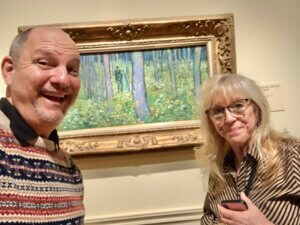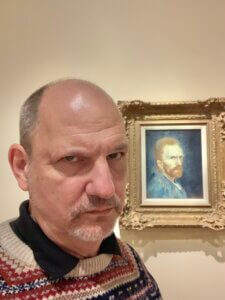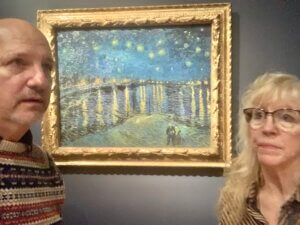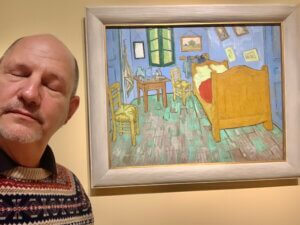
 I went to see Van Gogh in America today with my sister Betsy. Vincent’s family encourages everyone to take selfies with his art, so here goes nothing. More about my experience at
I went to see Van Gogh in America today with my sister Betsy. Vincent’s family encourages everyone to take selfies with his art, so here goes nothing. More about my experience atVincent John Doe. It was overwhelming, the amount of great and iconic work we saw in this collection. I was blown away that the fact that the Detroit Institute of Art was the first museum in America to buy a Van Gogh. And that Detroit was a key turning point in all the effort made by Van Gogh’s Sister in law and her daughter. It was a long, difficult evolution from obscurity to his acceptance as the great artist he was, in America.
 0
0
I enjoy reverse engineering his paintings, trying to figure out which color was the last layer and working backwards into the painting to see what color was on top of what. It helps me feel his process. It was overwhelming the way the colors interact with the surface texture and vibrate in the retina. If you look closely the canvases in person, you can see when he painted over a previously dry area of the canvas, where he allowed himself time to reflect and make deliberate improvements to his work, hours or days after the initial effort. But the juxtaposition of colors to create a specific deliberate combination is so difficult to put into words. It is deeply methodical, yet so purely emotional. And the dazzling way his colors vibrate together takes my breath away. Ironically, there were a couple paintings we had just seen in Amsterdam this past summer, borrowed from the Van Gogh Museum for this exhibition.


 Would you like to get inspiration in your inbox, rather than ads for more stuff? Welcome to ManiscalcoGallery.com
Would you like to get inspiration in your inbox, rather than ads for more stuff? Welcome to ManiscalcoGallery.com